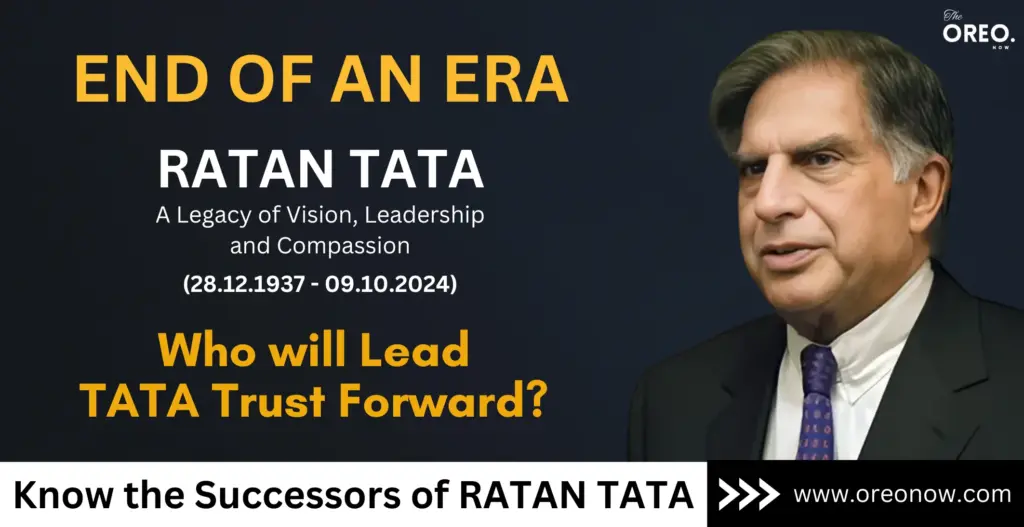Ratan Tata Passes Away: Who will Lead TATA Trust Forward?

The world has lost one of its most respected industrialists, Ratan Tata, Chairman Emeritus of Tata Sons, who passed away at the age of 86 in Mumbai. The beloved business leader and philanthropist was admitted to Breach Candy Hospital for routine age-related checkups earlier this week. However, on Wednesday night, he was moved into intensive care, where he ultimately passed away. His death was officially confirmed by the Tata Group, following a heartfelt post by Harsh Goenka, head of RPG Group, on social media platform X.
Though Ratan Tata reassured his well-wishers earlier in the week with a calm message on X, where he downplayed concerns about his health, his hospitalization inevitably sparked speculation and discussions about the future leadership of the Tata empire. With Tata’s departure, attention has shifted towards the next generation of potential leaders within the Tata family, especially those rising quietly but steadily through the ranks.
Ratan Tata, born into the illustrious Tata family, took the reins of Tata Group in 1991. Under his leadership, the company transformed into a global conglomerate, expanding into numerous sectors such as steel, automobiles, information technology, and more. It was during his tenure that Tata Motors introduced the Tata Nano, the world’s most affordable car, and acquired iconic international brands like Jaguar Land Rover. These strategic moves not only placed Tata Group on the global map but also underscored Ratan Tata’s knack for identifying opportunities in both emerging and developed markets.
The Legacy of Ratan Tata
Ratan Tata’s contributions to the Tata Group are legendary. He took the reins as Chairman of Tata Sons in 1991, guiding the salt-to-software conglomerate into a new era of growth and expansion. Under his leadership, Tata Group launched several groundbreaking ventures, including Tata Teleservices in 1996 and the public listing of Tata Consultancy Services (TCS) in 2004, which became one of the world’s largest IT services firms.
During his tenure, Tata Group also made bold global acquisitions that solidified its place as a multinational powerhouse. These included the purchase of the iconic British car brands Jaguar Land Rover and the Anglo-Dutch steel giant Corus. These strategic moves not only transformed the company but also elevated India’s standing on the global business stage.
Though Ratan Tata officially stepped down as Chairman in 2012, he remained a powerful influence within the Tata empire, retaining the honorary title of Chairman Emeritus of Tata Sons, Tata Motors, Tata Steel, Tata Chemicals, and other major Tata companies. More significantly, he continued to oversee Tata Trusts, which play a pivotal role in Indian philanthropy, funding initiatives in healthcare, education, rural development, and more.
In recognition of his immense contributions to Indian industry and society, Ratan Tata was awarded two of the country’s highest civilian honours: the Padma Bhushan in 2000 and the Padma Vibhushan in 2008.
Who will Lead TATA Trust Forward?
As the world mourns the loss of Ratan Tata, questions naturally arise about the future leadership of Tata Trusts. The Trusts, which own a significant stake in Tata Sons, the holding company of Tata Group, have long been a cornerstone of the conglomerate’s social responsibility efforts. While no one can truly replace the wisdom and vision of Ratan Tata, the Trusts will likely continue under the leadership of a seasoned and responsible individual, someone who embodies Tata’s values and commitment to social causes.
One possible successor is Noel Tata, Ratan Tata’s half-brother, who has held various leadership roles within the Tata Group. Noel has been associated with key Tata businesses and has the experience and insight to guide Tata Trusts forward.
While Ratan Tata was never married and has no children of his own, attention is being drawn to the emerging generation of the Tata family, particularly the children of Noel Naval Tata, Ratan Tata’s half-brother. These rising stars—Leah, Maya, and Neville Tata—are quietly establishing themselves within the company, showing promise as future leaders of the vast Tata empire.
Leah Tata, the eldest of the three, holds a Master’s degree in Marketing from the prestigious IE Business School in Madrid, Spain. She began her career with the Tata Group in 2006, joining as an assistant sales manager at Taj Hotels Resorts & Palaces. Over the years, Leah has risen through various roles, and she currently serves as Vice President at The Indian Hotels Company Limited (IHCL), a key part of the Tata Group’s hospitality business.
Maya Tata, the younger daughter, embarked on her professional journey at Tata Capital, the group’s flagship financial services company. She worked as an analyst, gaining valuable experience in one of the key segments of the Tata empire.
Meanwhile, their brother, Neville Tata, followed in their father’s footsteps by joining Trent, the retail arm of the Tata Group that Noel Tata was instrumental in developing. With a background in retail and operations, Neville is poised to play a significant role in the continued expansion of the Tata Group’s retail presence.
A Legacy That Surpasses Generations
Ratan Tata’s passing marks the end of an era for the Tata Group, but his legacy will continue to inspire not only future leaders within the company but also millions of people around the world. His vision extended far beyond business—he championed ethical leadership, social responsibility, and the importance of giving back to society. Under his guidance, the Tata Group became synonymous with integrity, innovation, and philanthropy.
As Tata Trusts continue their work in uplifting communities and improving lives across India, they will carry forward Ratan Tata’s dream of a more equitable and just society. And as the next generation of Tata heirs begins to take on greater responsibility, they will undoubtedly seek to uphold the values that their legendary predecessor instilled in the company.
Ratan Tata may no longer be with us, but his impact will resonate for generations to come. His contributions to industry, his charitable efforts, and his humble leadership style have left an indelible mark not just on the Tata Group but on the world at large.



